[Dec 2007, Volume 4 Quarterly Issue] Pdf File size - The IIPM Think ...
[Dec 2007, Volume 4 Quarterly Issue] Pdf File size - The IIPM Think ...
[Dec 2007, Volume 4 Quarterly Issue] Pdf File size - The IIPM Think ...
Create successful ePaper yourself
Turn your PDF publications into a flip-book with our unique Google optimized e-Paper software.
T.R.Manoharan,<br />
Senior Coordinator, Forest Programme,<br />
WWF-India,New Delhi<br />
India’s Growing Ecological Footprint: Exploring<br />
Past And Future Changes<br />
"<strong>The</strong>re is enough for everybody’s<br />
need, but not enough<br />
for anybody’s greed."<br />
-Mahatma Gandhi<br />
Introduction<br />
A high economic growth is essential for<br />
India to ensure improved living conditions<br />
of its citizens, which majorly consists of<br />
poor and marginalized sections. <strong>The</strong> nation<br />
possesses only 2.2 per cent of the land<br />
mass but home to 16 per cent of world<br />
population and 27 percent of world’s poor.<br />
Despite its low per capita income, India is<br />
presently the world’s tenth largest economy<br />
in terms of GDP. <strong>The</strong> economy is<br />
growing at 7 to 8 per cent per annum since<br />
2003 and is targeted to grow at 9 per cent<br />
or above during <strong>2007</strong>-12 (Planning Commission,<br />
2006; World Bank, <strong>2007</strong>). To<br />
achieve this target, increased use of bioresources-<br />
both within the country and<br />
elsewhere is inevitable.<br />
Available estimates show that humanity’s<br />
ecological footprint (demand on ecosystems)<br />
has exceeded the bio-capacity of<br />
the planet by late 1980s and the over shoot<br />
is accumulating ever since. It is pointed<br />
out that world is following unsustainable<br />
path of development and the growing ecological<br />
debt is a major factor. Presently,<br />
we are using 30 percent more resources<br />
than the planet can regenerate (In other<br />
words, 1.3 planets). <strong>The</strong> global footprint<br />
network estimates ecological debt day for<br />
every year to create awareness on how humanity’s<br />
consumption patterns are depleting<br />
the planets bio-resources . In <strong>2007</strong>,<br />
the ecological debt day was October 6. By<br />
that day the humanity has consumed total<br />
amount of new resources that the planet<br />
can produce this year. Ecological debt day<br />
marks the day when we begin to live beyond<br />
our ecological means. If we continue<br />
the current path of development, the<br />
ecological debt day will come earlier in<br />
every year. Several options are available<br />
now to minimize the risk of accumulated<br />
ecological debt (WWF, 2006; UNEP,<br />
<strong>2007</strong>). India, being one of the fastest<br />
growing economies in the world with more<br />
than one billion people, can play a crucial<br />
role to address this global challenge. It is<br />
possible to minimize the ecological footprint<br />
of the nation while continuing higher<br />
economic growth and efforts to attain<br />
high human development.<br />
164 THE <strong>IIPM</strong> THINK TANK


![[Dec 2007, Volume 4 Quarterly Issue] Pdf File size - The IIPM Think ...](https://img.yumpu.com/29766298/163/500x640/dec-2007-volume-4-quarterly-issue-pdf-file-size-the-iipm-think-.jpg)
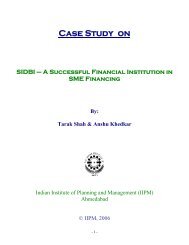
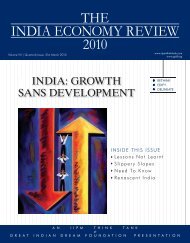
![[Feb 2008, Volume V Annual Issue] Pdf File size - The IIPM Think Tank](https://img.yumpu.com/43961117/1/190x245/feb-2008-volume-v-annual-issue-pdf-file-size-the-iipm-think-tank.jpg?quality=85)
![[June 2008, Volume V Quarterly Issue] Pdf File size - The IIPM Think ...](https://img.yumpu.com/41693247/1/190x245/june-2008-volume-v-quarterly-issue-pdf-file-size-the-iipm-think-.jpg?quality=85)
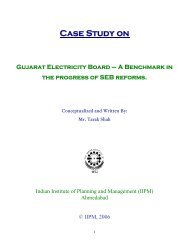
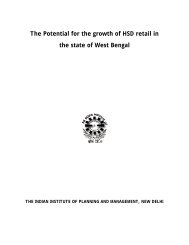
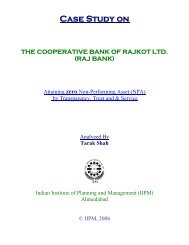


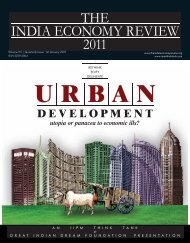
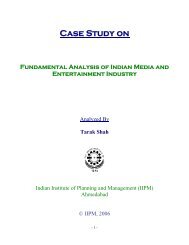
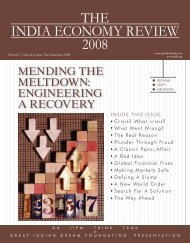
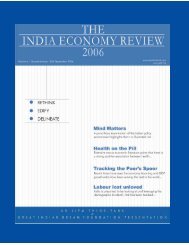
![[Volume VI | Quarterly Issue: 31st May 2009] Pdf File size](https://img.yumpu.com/27796051/1/190x245/volume-vi-quarterly-issue-31st-may-2009-pdf-file-size.jpg?quality=85)